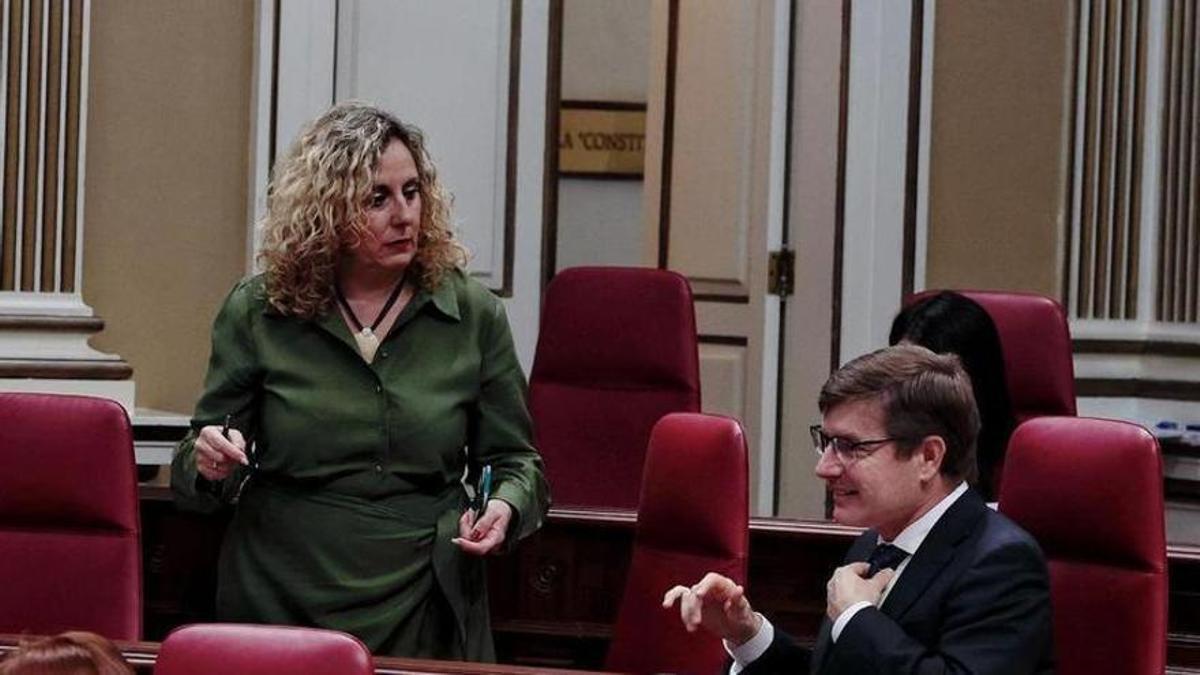
The former Vox deputy Marta Gómez converses with the parliamentary spokesperson Nicasio Galván, in an archived image. / María Pisaca
One of the most peculiar situations in Canarian politics involves Vox. Supposedly, this far-right organisation is experiencing a positive moment. Reports indicate that they could secure between six and seven deputies in the Parliament of the Canary Islands if elections were conducted today. In May 2023, they acquired four seats. They also have municipal councillors in Santa Cruz de Tenerife, Las Palmas de Gran Canaria, Telde, La Laguna, and various other municipalities. Furthermore, in the last eighteen months, they have joined local governments in Teguise, Arona, and Granadilla de Abona. However, this seemingly successful scenario is misleading. Vox is facing a crisis in the Canary Islands, and has never fully recovered. The history of Vox in the Canary Islands is predominantly one of ongoing crises that are at times scandalous, frequently amusing, and often both simultaneously.
Under the leadership of Santiago Abascal, the party has gone through two distinct phases. In neither of these phases have they been able to establish a robust organisational structure in the Canary Islands, with scandals and conflicts arising, including financial discrepancies – to put it mildly. There appears to be no real leadership for Vox in the Canary Islands, although two individuals can be identified. Both are elected councillors from the City Council of Las Palmas de Gran Canaria: Alberto Rodríguez, a congress deputy, and Nicasio Galván, a parliament deputy for the Canary Islands who is currently the President of Vox in Gran Canaria. There is no president representing Vox in Tenerife; the most significant figure is Alejandro Gómez, who leads the Vox organisation in Santa Cruz de Tenerife. The party has not held any congresses, and candidates have consistently been appointed by the National Directorate. The Ultras have also not disclosed membership numbers in Gran Canaria, Tenerife, or throughout the Canary Islands generally. A former Vox member expresses doubts that membership exceeds one thousand across all the islands, “at most, 1,500”. The criteria for membership seem quite lenient. “There are individuals who have attended meetings and informative sessions for years without being members,” the ex-Vox member states, “as paying dues appears to be overly bureaucratic.” That’s how it is.
It was Alejandro Gómez who led the Vox list for the Congress of Deputies in the general elections of 2023. Ultimately, Gómez was not a candidate, as four individuals from the list withdrew. The Ultras could not remedy the situation. Some councillors from Arona and Granadilla supported the internal opposition to Gómez’s list. They identify as Vox, yet do not adhere to Gómez or Galván, or at least claim not to. Consequently, when they were incorporated into the municipal administrations of both towns, no Vox leader was present to celebrate the news. Neither Galván nor any other Ultra deputy has called together their supposed colleagues in the Chamber. A profound mutual distrust exists. They fear that councillors now within local governments, without any genuine oversight or control from management bodies, might defect to other parties before the next elections. In an attempt to calm matters, it is reported that Ignacio Garriga, the general secretary of Vox (and a member of Opus Dei), recently visited Tenerife and held numerous phone conversations. So far, this intervention has yielded no positive results. Added to this is the fact that the mayor of La Laguna and Santa Cruz de Tenerife has made it clear they are unconcerned with the actions or statements of Galván or Rodríguez, and that one of its regional deputies, Marta Gómez, has left the Vox parliamentary group, now serving as an unaffiliated member in the Chamber. Vox, in the Canary Islands, is scarcely a political party. It may secure six seats in 2027, but it is more likely to implode beforehand.















